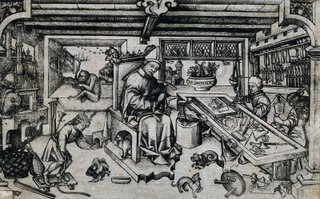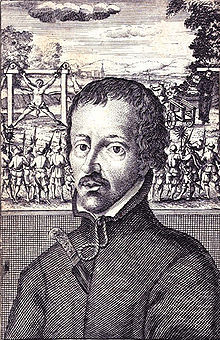
Ferial Day
SAINT ELIGIUS
Bishop
Bishop
[Historical]
SAINT EDMUND CAMPION
Priest/Martyr
[Historical]
Eligius, a goldsmith at Paris, was commissioned by King Clotaire to make a throne. With the gold and precious stones given him he made two. Struck by his rare honesty, the king gave him an appointment at court, and demanded an oath of fidelity sworn upon holy relics; but Eligius prayed with tears to be excused, for fear of failing in reverence to the relics of the Saints. On entering the court he fortified himself against its seductions by the austerities and continual ejaculatory prayers. He had a marvelous zeal for the redemption of captives, and for their deliverence would sell his jewels, his food, his clothes, and his very shoes, once by his prayers braking their chains and opening their prisons. His great delight was in making rich shrines for relics. His srtiking virtue caused him, a layman and a goldsmith, to be made Bishop of Noyon, and his sanctity in this holy office was remarkable. He possessed the gifts of miracles and prophecy, and died in 665.
Mass of a CONFESSOR BISHOP,
COLLECT
O Almighty God, grant that our solemn celebration of the feast of Your confessor bishop Eligius may increase our devotion and bring us closer to our salvation. Through Our Lord . . .
SAINT EDMUND CAMPION
Edmund Campion was born in London, the son of a Catholic bookseller, who later became Protestant. Anti Catholic feeling during this period of the Reformation meant that England was a hotbed of religious conflict, and from 1534 Catholics were increasingly persecuted for their faith.
After
schooling at Christ’s Hospital, his precocious scholarship led
him to study at St John’s College, Oxford, where he became a Fellow
at only seventeen years of age. He was a renowned speaker and
teacher, and was chosen to present an address to Queen Elizabeth
at the age of twenty six. He impressed her so much that she tried
to recruit him to her service, an offer which he declined. He
later became a Deacon of the Church of England, and seemed destined
to become a rising star in that church. However he became uneasy
about the validity of their teachings, convinced that religious
truth lay with the Catholic Church.
In
June 1571 he left England to study at the English College at Douai
where he was received into the Catholic faith. Three years later
he moved to Rome and entered the Jesuit noviciate, afterwards
spending time in Vienna and Prague. He was ordained priest in
1578.
In
1580 he returned to England as part of the English Mission, ministering
to Catholics in this area (particularly Berkshire, Oxfordshire
and Northamptonshire) as well as in the north of England. During
this time he wrote his famous pamphlet “Decem Rationes” – Ten
Reasons, which argued against the validity of the Church of England.
This was secretly printed at Stonor Park, near Henley, a place
which frequently provided him with refuge. The pamphlet was distributed
anonymously and caused a sensation, leading to an increasingly
intensive manhunt. He was finally captured at Lyford Grange, near
Wantage and taken to the Tower of London.
Here
he was questioned in the presence of Queen Elizabeth, who asked
if he acknowledged her as the true Queen of England. He affirmed
this, and was offered wealth and dignities if he would renounce
his Catholic faith. He refused and remained in prison, being tortured
several times. He was summoned to four public conferences and
despite having no time to prepare and suffering the effects of
torture, he reportedly conducted himself so easily and readily
that he won much admiration from those present. He was finally
convicted of treason on trumped up charges that he had conspired
against the life of the Queen and had fomented rebellion. He and
his fellow accused priests received their death sentence by joining
in the singing of the Te Deum Laudamus. After spending his last
days in prayer he was taken to Tyburn and hanged, drawn and quartered,
a martyr for the Catholic faith.
Edmund
Campion was Beatified in 1886 by Pope Leo XIII and declared a
Saint in 1970 by Pope Paul VI as one of the Forty Martyrs of England
and Wales. His Feast Day is 1 December.
|

No comments:
Post a Comment
Please no anonymous comments. I require at least some way for people to address each other personally and courteously. Having some name or handle helps.
Note: Only a member of this blog may post a comment.